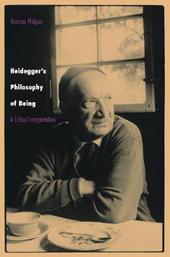
|
Heidegger's Philosophy of Being: A Critical Interpretation
Paperback / softback
Main Details
| Title |
Heidegger's Philosophy of Being: A Critical Interpretation
|
| Authors and Contributors |
By (author) Herman Philipse
|
| Physical Properties |
| Format:Paperback / softback | | Pages:576 | | Dimensions(mm): Height 235,Width 152 |
|
| Category/Genre | Philosophy - metaphysics and ontology
Philosophy of the mind |
|---|
| ISBN/Barcode |
9780691001197
|
| Classifications | Dewey:111 |
|---|
| Audience | | Professional & Vocational | | Tertiary Education (US: College) | |
|---|
|
Publishing Details |
| Publisher |
Princeton University Press
|
| Imprint |
Princeton University Press
|
| Publication Date |
17 January 1999 |
| Publication Country |
United States
|
Description
This scrupulously researched and rigorously argued book is the first to interpret and evaluate the central topic of Martin Heidegger's philosophy--his celebrated "Question of Being"--in the context of the full range of Heidegger's thought. With this comprehensive approach, Herman Philipse distinguishes in unprecedented ways the center from the periphery, the essential from the incidental in Heidegger's philosophy. Among other achievements, this allows him to shed new light on the controversial relationship between Heidegger's life and thought--in particular the connections between his philosophy and his involvement with Nazism. Philipse begins by explaining which problems an interpretation of Heidegger's question of being should solve, and he specifies which type of interpretation is the best basis for an evaluation of Heidegger's thought. He then identifies various strands or leitmotifs in Heidegger's idea of being, and shows how these strands hang together in the philosopher's work.In doing so, Philipse offers new insights into Heidegger's views on such subjects as human existence, authenticity, logic, and language, and into his readings of such philosophers as Aristotle, Kant, Hegel, and Nietzsche. Philipse then integrates into his interpretation of Heidegger's overall theory the latest scholarship about the philosopher's engagement with Nazism. Finally, Philipse examines the fundamental structures of Heidegger's philosophy and assesses whether Heidegger's views are true, probable, or possess some other epistemic or existential value. As the most thorough interpretation of Heidegger's theory of being now available, this work represents a new phase in the vigorous debate about the philosopher's life and works.
Author Biography
Herman Philipse is Professor of Philosophy at the University of Leiden in The Netherlands. In addition to books in Dutch on such subjects as Husserl's philosophy of logic, Descartes' ethical theory, and atheism, he has published articles in English on epistemology, philosophy of mind, Husserl, Heidegger, and Wittgenstein.
Reviews"A clear, well structured and provocative study of Heidegger's corpus."--Times Literary Supplement
|